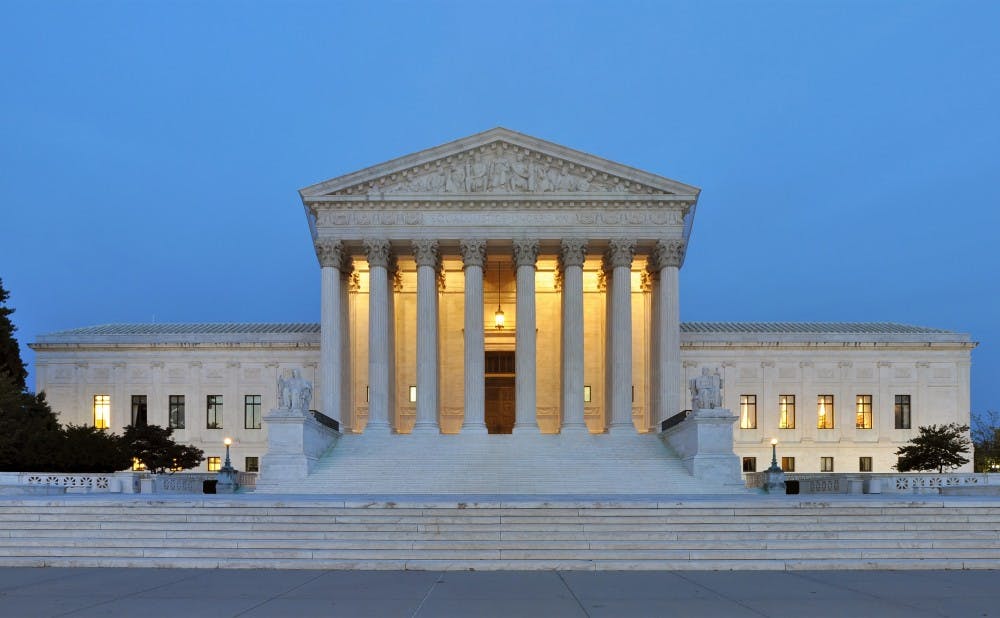The Supreme Court has ruled in a 6-3 decision that the use of race as an independent factor when making admissions decisions is unconstitutional.
The decision will impact undergraduate colleges and universities across the United States including Duke, which will most likely need to alter admissions practices to comply with the ruling.
President Vincent Price wrote in an email to the Duke community that University's position "continues to be that diversity is absolutely vital to our educational mission."
"We remain steadfastly committed to cultivating a racially and socially equitable Duke to the fullest extent permitted by the law," Price wrote. "... We will review the decision closely and determine what, if any, changes need to be made to our admission processes. We have already been planning for the many potential procedural implications. As this process unfolds, we remain committed to doing everything we can to foster a vibrant and diverse academic community."
Chief Justice John Roberts, who wrote the majority opinion, said that students must be treated based on their experiences as individuals and not on the basis of race, with many universities having "for too long done just the opposite."
“All I can say is that this opinion is 237 pages long, and the actual effect this decision will have on our recruitment and selection practices will depend on advice we receive from the University Counsel’s office,” wrote Dean of Undergraduate Admissions Christoph Guttentag in an email to The Chronicle.
In the fall, the Supreme Court heard oral arguments for two cases brought against Harvard University and the University of North Carolina at Chapel Hill by anti-affirmative action non-profit Students for Fair Admissions. SFFA believes that admissions practices at Harvard and UNC discriminate against Asian American applicants. Duke filed an amicus brief in support of Harvard and UNC with 14 other highly-ranked institutions.
The majority opinion notes that race-based affirmative action programs implemented at Harvard and UNC, while “well intentioned and implemented in good faith,” failed to comply with each of the Court’s “narrow restrictions” for race-based admissions.
“The Harvard and UNC admissions programs cannot be reconciled with the guarantees of the Equal Protection Clause. Both programs lack sufficiently focused and measurable objectives warranting the use of race, unavoidably employ race in a negative manner, involve racial stereotyping and lack meaningful end points,” Roberts wrote.
The opinion states that Harvard’s admissions process relies on “race for race’s sake” and uses racial stereotypes by allowing students to “obtain preferences on the basis of race alone,” and in doing so violates the Equal Protection Clause of the 14th Amendment. UNC’s admissions practices are similar, according to Roberts.
“Harvard’s admissions process rests on the pernicious stereotype that ‘a Black student can usually bring something that a white person cannot offer.’” Roberts wrote, quoting the majority opinion of the Regents of the University of California v. Bakke, where the Supreme Court ruled that racial quotas were unconstitutional, but the use of race as one factor among many others is permissible.
Now, the Court has overturned the precedent set in 1978 in the Bakke decision and reaffirmed in other cases. Studies have projected that because of this ruling, the percentage of Asian American students will increase and the percentage of Black and Hispanic students will decrease at many highly-selective undergraduate institutions.
“The entire point of the Equal Protection Clause is that treating someone differently because of their skin color is not like treating them differently because they are from a city or from a suburb, or because they play the violin poorly or well,” Roberts added in the decision.
Duke economist Peter Arcidiacono was retained by SFFA as an expert witness in the initial stages of the case. He has studied admissions practices at Harvard and UNC and wrote that “affirmative action leads African American and Hispanic applicants to be significantly more likely to be admitted relative to their observationally equivalent white and Asian American peers.”
“You definitely see large bumps for Black applicants, large bumps for Hispanic applicants that are smaller than the bumps you get for Black applicants,” Arcidiacono told The Chronicle in January of 2022.
The Court's conservative justices fixated on this idea of "bumps" or "tips" based on race serving as a dispositive factor in admissions decisions, when questioning Harvard's attorney, Seth Waxman, during oral arguments.
While the use of race as an independent factor when making admissions decisions was deemed unconstitutional, the Court acknowledged that race can affect a person’s life in many ways, which colleges and universities may consider when making decisions.
“At the same time, as all parties agree, nothing in this opinion should be construed as prohibiting universities from considering an applicant’s discussion of how race affected his or her life, be it through discrimination, inspiration, or otherwise,” Roberts wrote in the opinion.
“A benefit to a student who overcame racial discrimination, for example, must be tied to that student’s courage and determination. Or a benefit to a student whose heritage or culture motivated him or her to assume a leadership role or attain a particular goal must be tied to that student’s unique ability to contribute to the university,” he added.
Justice Sonia Sotomayor, joined by Justices Elena Kagan and Ketanji Brown Jackson, filed a dissenting opinion for the case against UNC. Sotomayor and Kagan also dissented in the Harvard case. Brown did not take part in the decision or consideration of the Harvard case, as she formerly served on Harvard’s Board of Overseers.
This is a developing story and will be updated as more information becomes available from the University.
Get The Chronicle straight to your inbox
Signup for our weekly newsletter. Cancel at any time.

Adway S. Wadekar is a Trinity junior and former news editor of The Chronicle's 119th volume.

Audrey Wang is a Trinity junior and data editor of The Chronicle's 120th volume. She was previously editor-in-chief for Volume 119.

